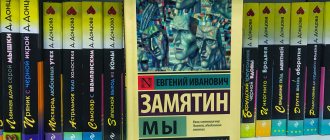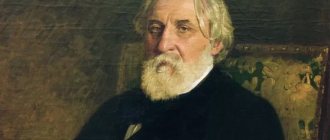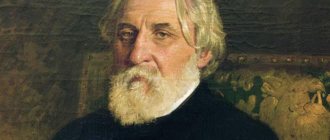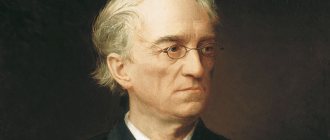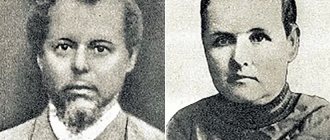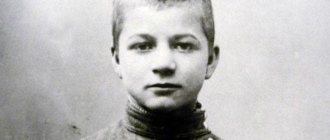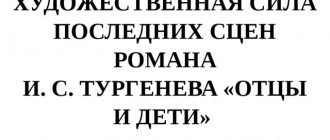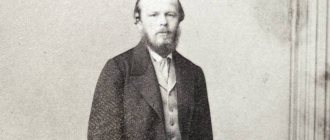- Summary
- Turgenev
- New
The events of the novel take place in the 60s of the nineteenth century, a time of growing revolutionary sentiment among the intelligentsia and students, the emergence of secret circles and societies that set the goal of organizing a peasant revolution in Russia.
The action begins in St. Petersburg. The protagonist of the novel, Alexey Nezhdanov, is a member of one of these societies. His colleagues Mashurina and Ostroumov are concerned about carrying out the orders of the secret leadership and the financial problems associated with them. Alexei, clearly burdened by his position, accepts with relief the offer of the dignitary Sipyagin and leaves as his son’s teacher in the S-th province.
On Sipyagin's estate, the heroes of the novel form two camps of opposing beliefs. On the one hand, there is Sipyagin, a liberal in words, his power-hungry wife Valentina Mikhailovna, and an ardent conservative Kallomeitsev. They are opposed by Nezhdanov himself, Valentina Mikhailovna Markelov’s brother, also a member of a secret society, and Sipyagin’s niece Marianna, a girl of the same beliefs as them.
The circle of local revolutionaries also includes a paper mill mechanic, Solomin, a man of the people who does not share the theories of his comrades, but is ready for practical action.
Real attempts to “reach out to the people” end in failure for the heroes. Markelov, who openly calls on the peasants to revolt, is captured and handed over to the police by the same peasants. Nezhdanov, trying to find a common language with the people, is drunk by the men in a tavern and ridiculed. As a result, completely disillusioned with himself and with revolutionary ideas, he commits suicide. Ostrodumov was killed by a tradesman for campaigning, Mashurina is hiding abroad.
What does the novel, directed by the author to like-minded heroes, teach? The epigraph to the novel - “New things should be raised not with a superficially sliding plow, but with a deep-reaching plow” - expresses Turgenev’s position on the futility of riots and coups, but the need for constant work, education and gradual transformations of society.
You can use this text for a reader's diary
Turgenev. All works
- Andrey Kolosov
- Asya
- Asya by chapters
- Bezhin meadow
- Biryuk
- Brigadier
- Mayor
- On the road
- Spring waters
- Sparrow
- Hamlet of Shchigrovsky district
- Two landowners
- Two friends
- Noble Nest
- Diary of an Extra Man
- Smoke
- Ermolai and the miller's wife
- Living relics
- Breakfast with the leader
- Notes of a Hunter
- The story of Lieutenant Ergunov
- Kasyan with a beautiful sword
- Clara Milic
- The end of Tchertopkhanov
- Office
- Lebedyan
- Forest and steppe
- Lgov
- Raspberry water
- A month in the village
- My neighbor Radilov
- Mu Mu
- The day before
- Freeloader
- Beggar
- New
- Odnodvorets Ovsyannikov
- Fathers and Sons
- Singers
- First love
- First love by chapters
- Song of Triumphant Love
- Pyotr Petrovich Karataev
- Trip to Polesie
- Provincial
- Punin and Baburin
- Father Alexey's story
- Rudin
- Date
- Death
- Dog
- Dream
- King Lear of the Steppes
- Strange story
- Knocking!
- Tatyana Borisovna and her nephew
- Three meetings
- District doctor
- Faust
- Bachelor
- Khor and Kalinich
- Watch
- Tchertophanov and Nedopyuskin
Summary: Nov
With the Sipyagins, Nezhdanov gets a job as a home teacher precisely at the moment when he needs a change of scenery. In St. Petersburg he lived in a room with two windows. It was here that Boris Andreevich Sipyagin once came along with his aide-de-camp, Prince G. He was looking for a teacher for his son for the summer. He was recommended to Sipyagin by his relative. Nezhdanov is a relative of Prince G., he is one of his brothers, who does not recognize him, since he is the illegitimate son of his father, but he is paid money because his father wanted it that way. All his life Alexey suffers because of his ambiguous position. When Sipyagin arrived, Nezhdanov’s St. Petersburg friends were also in the room: Mashurina, Ostrodumov, and Paklin.
Now Nezhdanov took a break from his friends, wrote poetry, but he hid this. The Sipyagins had a large house with a garden. Valentina Mikhailovna shares the passions and beliefs of her husband, who is a liberal figure and a humane landowner. She was smart and pretty. She loved to subordinate and lead, especially in her relationship with Marianna, who is her husband’s niece. Her father was a general who was convicted of embezzlement and sent to Siberia, but then he was forgiven and he returned and died in poverty. Then her mother died, and Uncle Boris Andreevich sheltered Marianna. The girl has the position of a poor relative, she teaches the Sipyagins’ son French lessons. She is very burdened by her dependence on her domineering aunt. Auntie considers Marianne an atheist and a nihilist. Nezhdanov sees a kindred spirit in Marianna. They like each other, but Valentina Mikhailovna’s brother Sergei Mikhailovich Markelov, who is an ugly, bilious and gloomy person, is passionately in love with Marianna. He often appears in the house. Nezhdanov and the conservative Kallomiytsev do not hide their distrust of the revolution. It turns out that Markelov came to meet with Nezhdanov, since he brought him a letter from Vasily Nikolaevich himself, who recommended that they both interact in accordance with well-known rules. They decide to talk at Markelov’s estate, since in the sister’s house the walls have ears.
Sergei Mikhailovich has a surprise waiting for Nezhdanov. Mashurin and Ostrodumov smoke and drink beer in his living room. They talk until the morning about who they can rely on. Markelov says that it is necessary to involve the mechanic-manager of the local paper spinning factory, Solomin, as well as the merchant Golushkin. Nejdanov again feels mentally tired, because again they talked a lot about the need to act, but no one knows what these actions should be for. Marianna refused Markelov. Alexey Dmitrievich even wants to tell Marianna about Vasily Nikolaevich’s letter. Valentina Mikhailovna, who liked Nezhdanov, realized that he had turned his back on her, and Marianna was to blame for this, and she wants to take action. Very soon they confess their love to each other, their conversation was overheard by Mrs. Sipyagina.
Markelov and Nezhdanov go to Solomin; he worked in England for two years, and therefore knows very well modern production. He understands that the people are not ready for revolution. He opened a hospital and a school at the factory. On the way to Golushkin they meet Paklin, who calls them to the “oasis”, to the old people - the spouses Fomushka and Fimushka, who live as if they were in the 18th century courtyard. There is also the old servant Kalliopych, and the dwarf Pufka is also there for entertainment. Galushkin donates large sums to the cause at dinner in a drunken stupor. On the way back, Markelov scolds Nezhdanov for not believing in the matter. But he said all this out of jealousy towards Marianne, since he had received a letter from his sister and knew everything about the lovers’ confessions. Nezhdanov talks about the need for a duel, but having come to his senses, Markelov asks for forgiveness. Markelov hands Nezhdanov a portrait of Marianna, but Nezhdanov does not want to take it. On the same day they met. Marianne is interested in how the meeting went. Then Marianne talks about the need to run away, he says that he will follow her to the ends of the earth.
The Sipyagins are trying to lure Solomin to their side. He came to visit them, but refused to go over to their side. Marianna listens carefully to Solomin, and catches herself thinking that she compares Solomin with Nezhdanov, where the former wins. They are at the factory in an inconspicuous annex. Along with Solomin are Pavel and his wife Tatyana, who does not understand anything about what is happening. They all get together to talk and also read Alexei’s poems, which Marianna evaluates quite harshly. Nezhdanov says that she buried them.
The day has come when you need to go to the people. Nezhdanov, in boots, a caftan, a cap with a broken visor. His exit did not last long, the men do not understand what we are talking about, although they are not happy with their lives. Alexey writes a letter to Silin, in which he says that the time to act will probably never come. He also doubts his feelings for Marianne. Suddenly a letter arrives, from which it becomes clear that the neighboring county is uneasy, he decides that this is the work of Markelov. He decides to go there and find out everything. When Nezhdanov leaves, Mashurina arrives, who has another letter for Nezhdanov. She hid the letter and told him to give it to him so that he would be more careful. Finally, Pavel arrives with Nezhdanov, the second one completely drunk. Pavel quickly rescued him from the tavern where the men had dragged him.
Unexpectedly, Paklin arrived and reported that the peasants had captured Markelov and handed over the clerk, Golushkin, to the owner. The police will soon come to the factory. The next morning, Nezhdanov has an explanation with Marianna, he realized that she needs another person, and this person should be Solomin. Nezhdanov no longer believes in the cause that unites him and Marianna. She continues to believe and is ready to devote her whole life to this. Solomin asks everyone to hurry up as the police will arrive soon. Marianna goes to pack her things, and Nezhdanov puts two sealed pieces of paper on the table, then goes into Marianna’s room and kisses the bed at her feet, and goes to the factory courtyard, where, stopping at an old apple tree, he shoots himself in the heart.
He is still alive and is transferred to a room where he joins the hands of Marianna and Solomin. When the police arrived, they only found Nezhdanov’s body. Solomin and Marianna left and got married two days later. Markelov was convicted, Ostrodumov was killed by a tradesman whom he tried to persuade to revolt. Mashurina disappeared. Golushkin was subjected to a light punishment for his sincere confession. Solomin was left alone because there was not enough evidence, and there was no talk of Marianna. Sipyagin talked with the governor and Paklin, who provided the investigation with a favor, and said that where Marianna and Nezhdanov were, they were released.
In St. Petersburg in the winter of 1870, he met Mashurina. She did not immediately approach Paklin, she told him about how abroad some man in uniform showed interest in her, and she told him in Russian to leave her alone, and he left. Paklin talks about Solomin, whom he considers the real future of Russia. When Mashurina was about to leave, she asked him to give him something in memory of Nezhdanov. Paklin gave her a photograph. Paklin asked her a question about who is now in charge of her, she said that perhaps it was the nameless one.
Please note that this is only a brief summary of the literary work “Nove”. This summary omits many important points and quotes.
Nezhdanov gets a job as a home teacher with the Sipyagins at a time when he really needs money, and even more, a change of scenery. Now he can rest and gather his strength, the main thing is that he “fell out from under the tutelage of his St. Petersburg friends.”
In St. Petersburg he lived in a dark room with an iron bed, a bookcase filled with books, and two unwashed windows. One day a respectable, overly self-confident gentleman, Boris Andreevich Sipyagin, well-known to the bureaucrats of St. Petersburg, appeared in this room. He needs a teacher for his son for the summer, and the aide-de-camp Prince G. (“it seems like your relative”) recommended Alexei Dmitrievich.
At the word “relative,” Nezhdanov instantly blushes. Prince G. is one of his brothers who do not recognize him, an illegitimate, but who pay him an annual “pension” at the behest of his late father. Alexey suffers all his life from the ambiguity of his position. For this reason, he is so painfully proud, so nervous and internally contradictory. Isn’t this the reason why I’m so lonely? Nezhdanov has plenty of reasons to be embarrassed. In the smoke-filled cell of the “princely relative”, Sipyagin found his “St. Petersburg friends”: Ostrodumov, Mashurina and Paklin. Sloppy figures, heavy and clumsy; careless and old clothes; rough features of Ostrodumov’s face, still pitted with smallpox; loud voices and red large hands. In their appearance, however, “there was something honest, and persistent, and hardworking,” but this could no longer correct the impression. Paklin was an extremely small, homely man, who suffered greatly from this because of his passionate love for women. With his meager stature, he was still a Strength (!) Sonny himself (!). However, the students liked him with his cheerful bile and cynical glibness (the Russian Mephistopheles, as Nezhdanov called him in response to being called the Russian Hamlet). Paklin was also hurt by the revolutionaries’ undisguised distrust of him.
Now Nezhdanov was taking a break from all this. He was no stranger to the aesthetic, wrote poetry and carefully hid it in order to “be like everyone else.”
The Sipyagins have a large stone house, with columns and a Greek pediment. Behind the house there is a beautiful, well-kept old garden. The interior bears the imprint of the latest, delicate taste: Valentina Mikhailovna fully shares not only the beliefs, but also the passions of her husband, a liberal figure and a humane landowner. She herself is tall and slender, her face is reminiscent of the Sistine Madonna. She was accustomed to disturbing the peace of her heart, and not at all in order to establish a special relationship with the object of her encouraging attention. Nejdanov did not avoid it, but quickly realized the lack, so to speak, of content in her subtle appeal and demonstration of the supposed lack of distance between them.
Her tendency to subordinate and dominate is especially obvious in her relationship with Marianne, her husband’s niece. Her father, a general, was convicted of embezzlement and sent to Siberia, then forgiven, returned, but died in extreme poverty. Soon her mother died, and Marianna was sheltered by her uncle Boris Andreevich. The girl lives in the position of a poor relative, gives French lessons to the Sipyagins’ son and is very burdened by her dependence on the domineering “aunt”. She also suffers from the knowledge that others know about the dishonor of her family. “Auntie” knows how to casually mention this to her friends. In general, she considers her a nihilist and atheist.
Marianna is not a beauty, but she is attractive, and her beautiful figure resembles an 18th-century Florentine figurine. In addition, “from her whole being there was something strong and bold, impetuous and passionate.”
Is it surprising that Nezhdanov sees a kindred spirit in her and turns his attention to her, which does not remain unrequited. But Valentina Mikhailovna’s brother Sergei Mikhailovich Markelov, an ugly, gloomy and bilious man, is passionately and hopelessly in love with Marianna. As a relative, he visits a house where the main principles are freedom of opinion and tolerance, and at the table, say, Nezhdanov and the extreme conservative Kallomiytsev, who does not hide his dislike for nihilists and reforms, come together.
Unexpectedly, it turns out that Markelov came to meet with Nezhdanov, to whom he brought a letter from Vasily Nikolaevich “himself”, recommending that they both interact “in disseminating known rules.” But it’s better to talk on Markelov’s estate, otherwise in the house the sisters and the walls have ears.
Sergei Mikhailovich Nezhdanov has a surprise waiting for him. In the living room, by the light of a kerosene lamp, Ostrodumov and Mashurin are drinking beer and smoking. Until four in the morning there is talk about who they can rely on. Markelov believes that it is necessary to attract the “mechanic manager” of the local paper mill, Solomin, and the merchant from the schismatics, Golushkin. In his room, Nezhdanov again feels terrible mental fatigue. Again, a lot has been said that we need to act, that it’s time to start, but no one knows what to do. His “St. Petersburg friends” are limited, although honest and strong. However, in the morning he noticed on Markelov’s face traces of the same mental fatigue of an unfortunate, unlucky man.
Meanwhile, after Markelov’s refusal, Marianna and Nezhdanov increasingly feel mutual sympathy. Alexey Dmitrievich even finds it possible to tell the girl about Vasily Nikolaevich’s letter. Valentina Mikhailovna understands that the young man has completely turned his back on her and that Marianne is to blame: “We need to take action.” And young people are already switching to “you”, and an explanation soon follows. This did not remain a secret for Mrs. Sipyagina. She overheard this at the door.
Solomin, to whom Nezhdanov and Markelov go, once worked in England for two years and knows modern production very well. He is skeptical about the revolution in Russia (the people are not ready). He opened a school and a hospital at the factory. These are his specific affairs. In general, there are two ways to wait: wait and do nothing, and wait and move things forward. He chose the latter.
On the way to Golushkin, they come across Paklin and invites them to an “oasis”, to the old people - the spouses Fimushka and Fomushka, who continue to live as if in the courtyard of the 18th century. In what way of life they were born, grew up and got married, that’s how they remained. “Standing water, but not rotten,” he says. There are also servants here, there is an old servant Kalliopych, who is sure that the Turks have their will. There is also the dwarf Pufka, for entertainment.
Galushkin ordered dinner “with force.” In a drunken spirit, the merchant donates large sums to the cause: “Remember Capito!”
On the way back, Markelov reproaches Nezhdanov for not believing in the matter and cooling down towards it. This is not without reason, but the subtext is different and dictated by jealousy. He knows everything: with whom the handsome Nezhdanov was talking, and with whom he was in the room after ten in the evening. (Markelov received a note from his sister and really knew everything.) Only this is not merit, but the well-known happiness of all the illegitimate ones, all of you!
Nezhdanov promises to send seconds upon his return. But Markelov has already come to his senses and begs for forgiveness: he is unhappy, even in his youth “he was deceived by one.” Here is a portrait of Marianna that I once painted myself and is now handing over to the winner. Nejdanov suddenly feels that he has no right to take it. Everything said and done seemed like a lie. However, as soon as he sees the roof of the Sipyagin house, he tells himself that he loves Marianna.
On the same day there was a date. Marianne is interested in everything: and when it will finally begin; and what kind of Solomin is he? and what is Vasily Nikolaevich like? Nezhdanov notes to himself that his answers are not exactly what he really thinks. However, when Marianne says: she needs to run, he exclaims that he will go with her to the ends of the world.
Meanwhile, the Sipyagins are trying to lure Solomin to themselves. He accepted the invitation to visit them and inspect the factory, but refused to go. A nobleman's factory business will never work; these are strangers. And landownership itself has no future. The merchant will take the land into his hands. Marianna, listening to Solomin’s words, becomes more and more imbued with confidence in the thoroughness of a man who cannot lie or boast, who will not betray, but will understand and support. She catches herself comparing him with Nezhdanov, and not in favor of the latter. So Solomin immediately made the idea of both leaving the Sipyagins a reality by offering him refuge in his factory.
And now the first step towards the people has been taken. They are at the factory in an inconspicuous outbuilding. Solomin's devotee Pavel and his wife Tatyana are sent to help, who is perplexed: young people live in different rooms, do they love each other? They gather to talk and read together. Including Alexey's poems, which Marianna evaluates quite harshly. Nejdanov is offended: “You buried them - and by the way, me too!”
The day is coming to “go to the people.” Nezhdanov, in a caftan, boots, a cap with a broken visor. His test run does not last long: the men are dullly hostile or do not understand what they are talking about, although they are dissatisfied with their lives. In a letter to his friend Silin, Alexey reports that the time to act is unlikely to ever come. He also doubts his right to finally join Marianne’s life to his own, to a half-dead creature. And how he “goes among the people”—it’s impossible to imagine anything more stupid. Or take an axe. Only the soldier instantly kills you with a gun. It's better to commit suicide. The people are sleeping, and what we think will wake them up is not what we think.
Soon a message arrives: there is trouble in the neighboring district - it must be Markelov’s work. We need to go find out and help. Nezhdanov sets off, in his common folk attire. In his absence Mashurina appears: is everything ready? Yes, she also has a letter for Nezhdanov. But where is it? She turned away and quietly put the piece of paper in her mouth. No, she probably dropped it. Tell him to be careful.
Finally, Pavel and Nezhdanov return, reeking of fumes and barely able to stand on his feet. Finding himself in a crowd of men, he began to speak passionately, but some guy dragged him into a tavern: a dry spoon was in his mouth. Pavel barely rescued him and brought him home already drunk.
Unexpectedly, Paklin appeared with news: Markelov was captured by the peasants, and Golushkin’s clerk betrayed the owner, and he gave frank testimony. The police are about to raid the factory. He will go to Sipyagin to ask for Markelov. (There is also a secret calculation that the dignitary will appreciate his service.)
The next morning the final explanation takes place. Nezhdanov is clear: Marianna needs another person, not like him, but like Solomin... or Solomin himself. There are two people in it - and one does not allow the other to live. It’s better for both of us to stop living. The last attempt at propaganda proved Nezhdanov's inconsistency. He no longer believes in the cause that unites him with Marianne. She believes and will devote her whole life to the cause. Politics united them, but now this very foundation of their union has collapsed. “But there is no love between them.”
Solomin, meanwhile, is in a hurry to leave: the police will appear soon. And everything is ready for the wedding, as agreed. When Marianna goes to pack her things, Nezhdanov, left alone, puts two sealed pieces of paper on the table, goes into Marianna’s room and, having kissed her bed at the feet, goes to the factory courtyard. He stops at an old apple tree and, looking around, shoots himself in the heart.
Still alive, he is transferred to a room where, before dying, he tries to join the hands of Marianna and Solomin. One letter is addressed to Solomin and Marianna, where he entrusts the bride to Solomin, as if “connecting them with an afterlife hand,” and conveys greetings to Mashurina.
The police raided the factory and found only Nezhdanov’s body. Solomin and Marianna left ahead of time and two days later fulfilled Nezhdanov’s will - they got married.
Markelov was tried, Ostrodumov was killed by a tradesman whom he had incited to revolt. Mashurina disappeared. Golushkin was given a light punishment for “sincere repentance.” Solomin, due to lack of evidence, was left alone. There was no talk about Marianna: Sipyagin did talk to the governor. Paklin, as having rendered a service to the investigation (completely involuntary: relying on Sipyagin’s honor, he named where Nezhdanov and Marianna were hiding), was released.
In the winter of 1870 in St. Petersburg he met Mashurina. In response to the appeal, she replied in Italian with a surprisingly clear Russian accent that she was the Countess of Santo Fiume. Then she nevertheless went to Paklin, drank tea with him and told him how at the border someone in a uniform showed interest in her, and she said in Russian: “Get you off me.” He fell behind.
“Russian Mephistopheles” tells the “contesse” about Solomin, who is the real future of Russia: “a man with an ideal - and without a phrase, educated - and from the people”... Getting ready to leave, Mashurina asks for something in memory of Nezhdanov and, having received a photograph , leaves without answering Sila Samsonovich’s question, who is now leading it: all Vasily Nikolaevich, or Sidor Sidorich, or some nameless one? Already from the threshold she said: “Maybe the nameless one!”
“Nameless Rus'!” - Paklin repeated, standing in front of the closed door.
Roman by I. S. Turgenev “New”
About the creation of the novel “New” I. S. Turgenev wrote: “I will only note one thing, that none of my large works were written so quickly, easily (in three months) - and with fewer blots. After that, judge!..”
The always Turgenev method: long thinking and rapid writing. Back in 1870, the idea of the novel “Nov” arose; it was created in April-July 1876. The time of the novel, as the author himself designated it, is the end of the 60s of the 19th century, but later events were reflected in it: the so-called “going to the people” of 1874-1875. The Russian revolutionary intelligentsia at that time was experiencing a tragic awareness of its disunity with the people, who were deprived of a true understanding of the causes of their plight, and therefore alien to the goals to which these people devoted themselves. “Going to the people” was an attempt by the revolutionary raznochins to get closer to the people, to launch mass agitation among the peasantry in order to rouse them to a mass uprising against the regime.
Everything was planned rationally, but the “populists” themselves (as the new generation of revolutionaries began to be called) were still “far from the people,” whom they tried to induce uprisings and riots. Revolutionary work was carried out rapidly, but the peasants did not accept outsiders, and the movement was eventually crushed. From the very beginning, Turgenev was skeptical about the populism movement, understanding the decadence of the idea itself. Using this material, the writer created the novel “New,” in which he reflected his vision of the problem of the revolutionary populist movement and the path of historical development of Russia.
In the 60-70s of the 19th century, the so-called “anti-nihilistic novel” (against nihilists - hence the name) became widespread in Russian literature. The most significant “anti-nihilistic novel” is Dostoevsky’s “Demons.” Some critics considered Turgenev's last novels to belong to the same genre. “Nov” was often compared to “Demons”. It is known that the novel by F. M. Dostoevsky reflects the activities of the organization created by the anarchist conspirator Nechaev. Nechaev also appears on the pages of the novel “Nov”: the same mysterious Vasily Nikolaevich, from whom the heroes of the novel receive written orders from time to time. In addition, in the author’s drafts of the work there is a note about Mashurina: “Nechaev is making her his agent,” and about Markelov: “Completely convenient and ready almost for Nechaev and Co.”
In the novel itself, Markelov is characterized as follows: “A sincere, straightforward man, a passionate and unhappy nature, he could in this case turn out to be ruthless, deserve the name of a monster...” However, in the same Markelov, the author also identified quite attractive qualities: hatred of lies, compassion for oppressed, readiness for unconditional self-sacrifice. Turgenev pities his heroes - unfortunate, lost in their own mistakes, lost young people. He himself wrote about it this way: “I decided... to take young people, mostly good and honest, and show that, despite their honesty, their very cause is so false and lifeless that it cannot but lead them to a complete fiasco... Young people cannot say that the enemy has taken over their image; they, on the contrary, must feel the sympathy that lives in me - if not for their goals, then for their personalities.”
In this attitude towards revolutionaries, the author of “Novi” clearly opposed the “anti-nihilistic novel.” However, Turgenev does not sympathize with the cause that the young heroes are engaged in. First of all, the “populists” in the novel do not know at all how the real people live for whom they are ready to sacrifice themselves. They imagined some kind of abstract people, so they were too shocked when Markelov’s first attempt to rouse the peasants to revolt ended in failure: the peasants tied him up and handed him over to the authorities. Turgenev also emphasizes “a certain mental narrowness” of these people: “... people become so immersed in the struggle, in the technology of their various enterprises,” he said, “that they completely lose their breadth of outlook, they even give up reading and studying, mental interests gradually fade into the background ; and in the end, the result is something that is devoid of the spiritual side and turns into a service, into a mechanism, into whatever you want, just not a living thing.” There is no “living cause” - this is the author’s verdict on the heroes of “Novi”, for they are “ready to do, to sacrifice themselves, but they don’t know what to do, how to sacrifice...”. Among the chaos of doubts, contradictions, hopelessness, the “Russian Hamlet” - Nezhdanov rushes about in “Novi”: “So why is this vague, vague, aching feeling? Why, why this sadness?..” But Nezhdanov is Hamlet who decided to take on the role of Don Quixote. He strives for self-sacrifice for the sake of a lofty idea, but he himself also feels the falsity of his intentions, his aspirations. Nezhdanov's nature is broken - and there is no other outcome of his life other than suicide. But is there a truly strong personality, a “new Russian Insarov”?
Where is Bazarov? This long-standing Pisarev question seemed to hang in the air and could not help but be realized by readers and the author. But the author in 1874 expressed the idea that “The Bazarovs are not needed now. For real social activity you don’t need any special talents, or even a special mind...” Bazarov is not in Novi, but after a long break, the “Turgenev girl”, Marianna Sinetskaya, appears again in the novel. She contains all the same traits that are so attractive in the heroines of “Rudin”, “The Noble Nest”, “Nakashchne”: self-denial and compassion for the world: “... if I’m unhappy,” she admits to Nezhdanov, “it’s not because of my misfortune.” . KJ sometimes dreams to me that I suffer for all the oppressed, the poor? miserable people in Rus'... no, I don’t suffer - but I’m indignant for them, maybe? I regret...that I am ready...to lay down my head for them.” But even Marianne has the same limitations, “blinders on her eyes,” as the other heroes. “Novi” is preceded by an epigraph: “Novo should be raised not with a superficially sliding plow, but with a deep-reaching plow.”
Turgenev explained that “the plow in the epigraph does not mean revolution, but enlightenment.” The true hero for the writer is not Markelov or Nezhdanov, but Solomin. This is also not an outstanding, but an average person, but he is head and shoulders above others - in strength of character, intelligence, and understanding of real activities. Turgenev said about such people: “... I am convinced that such people will replace the current leaders: they have a well-known positive program, even if small in each individual case, they have practical dealings with the people, thanks to which they have ground under their feet... “Therefore, at the end of the novel, Solomin’s apotheosis sounds: “He’s great! And most importantly: he is not a sudden healer of social wounds. That’s why we, Russians, are such a people! We are all waiting: something or someone will come and at once heal us, heal all our wounds, pull out all our ailments like a bad tooth... But Solomin is not like that: no, he doesn’t pull out teeth. He’s great!” And yet, the longing for Bazarov - for his beautiful, strong nature did not leave the writer, even when he recognized the need for Solomin. There are some omissions and omissions in Novi, but this is explained by the fact that the author was going to write a continuation of the novel, dedicated to the new activities of Solomin and Marianna. Gradual transformations and enlightenment—that’s all Russia needs—is the author’s unshakable conviction.
Back in the early 60s of the 19th century, the writer expressed it in a polemic with Herzen. It was precisely the hope for the activities of the Solomins that did not allow Turgenev to become disillusioned with the possibilities of “universal peace.” It was with the gradual transformative activities of such people that the writer associated the possibility of reorganizing Russian social life. In fact, Solomin is not a completely new figure in Turgenev’s work. And in his previous novels one could meet heroes engaged in specific, quiet, but absolutely necessary work: Lezhnev (“Rudin”), Lavretsky (“Nest of the Nobles”), Litvinov (“Smoke”). In the continuation of "Novi" this guy was supposed to take a dominant position. Interest in people like Solomin became a manifestation of the writer’s social interests. Thus, the novel “New” was the logical conclusion of the creative activity of I. S. Turgenev, who opened Russian literature to the world and created unforgettable images of Russian people of the 40-70s of the 19th century. This is his greatest role and service to his dearly beloved Russia.
Bibliography
To prepare this work, materials were used from the site https://www.coolsoch.ru/
Information about the work “Novel by I. S. Turgenev “Nove””
Section: Literature and Russian language Number of characters with spaces: 8294 Number of tables: 0 Number of images: 0
Similar works
Symbols in I. S. Turgenev’s novel “Fathers and Sons”
43534
0
0
... to study this topic based on the material of a specific literary work. II. MAIN PART. FROM THE BEST OF “ORDINARY” TO “HIGHER ELEMENTS” /V.G.KOROLENKO/ (SYMBOLS IN I.S. TURGENEV’S NOVEL “FATHERS AND CHILDREN”) 1. THE CONCEPT OF SYMBOL. VARIETIES OF SYMBOLS. THE MEANING OF A SYMBOL IN A WORK OF ART Carrying out research on the topic “Symbols in I.S. Turgenev’s novel “Fathers and Sons””, first of all...
“Young Russia” in the novels of I.S. Turgenev
14711
0
0
... in defense of their independence, as happened during the Crimean War of 1853-1856. Just at the height of the Crimean War, the writer conceived his first novel, “Rudin” (1856). “Being inferior to some other works of Mr. Turgenev in the artistic consistency of the whole, “Rudin” should be staged, in terms of the depth and liveliness of the content it covers, in terms of the strength and the very nature of the impression, by it...
Ivan Sergeevich Turgenev's novel Fathers and Sons in the aspect of modern study of the classics
81190
0
0
... the main figure of the time was the Russian peasant, crushed by poverty, “the grossest superstitions,” it seemed blasphemous to “talk” about art, “unconscious creativity” when “it’s about our daily bread.” In Turgenev’s novel “Fathers and Sons,” two strong, vibrant characters collided. According to his views and convictions, Pavel Petrovich appeared before us as a representative of “a binding, chilling force...
Techniques for revealing character in I. S. Turgenev’s novel Fathers and Sons
29068
0
0
... everything in the world" (Chapter XVIII). The development of action in the novel “Fathers and Sons” is occasionally interrupted by the author’s digressions and descriptions of nature. Compared to Turgenev's other novels, Fathers and Sons is much poorer in landscapes and lyrical digressions. A subtle artist with the gift of extraordinary observation, able to notice “the hasty movements of the damp foot of a duck with which it scratches...
trounin.ru
In 1861, serfdom was abolished. And in 1877, Turgenev wrote “New,” turning the reader’s gaze to the province, where no changes occurred during this time: life and customs remained frozen at the time mark of the Napoleonic wars. The position of the French language among the nobility is still strong, and the peasants also subservient to the masters. Some cannot understand the importance of communicating in Russian, others still insist that God has placed a landowner over them, so nothing can be changed. Turgenev likes to place revolutionary heroes in such a swamp, beating their chests and making scenes in front of those gathered. A Concussion of Air contains clever phrases with which the reader always agrees, but Turgenev does not go further than this. Only Rudin from the novel of the same name seriously decided to defend ideals, while everyone else did not live to see the last page. Maybe Turgenev did not want to show the continuation of the struggle, or maybe he simply did not see the point in it, or did not want to describe actions that threatened the state with undermining the power of the emperor.
The 19th century was extremely difficult for Europe, shaken by revolutions. The active work of the Freemasons brought their main desire to life - empires and kingdoms collapsed. Turgenev's heroes stood up more for the common people, wanting to bring them out of slavery. And so the people came out into the world, but it didn’t make them any better. For him, this is wild. He is not yet ready for change. Why this “New” coming from the gentlemen? Do they know that by raising some from their knees, they will put others on their knees? Turgenev’s next hero is tormented by ideas, he is burned from within by a thirst to see a different structure of the world. He is talkative and capable of making hand gestures, but internally he understands the futility of his aspirations. Or this is suggested to him by the author, who considers this to be meaningless. There is no Novi in “Novi” - again the hero cannot stand it. The Russian, according to Turgenev, is not capable of taking decisive measures.
Turgenev does not see the opportunity to move from words to deeds. For him, the emergence of thoughts contrary to the world order is possible only in the upper strata of society. The lower strata have no desire to change anything. While someone is furious with thoughts, as long as he is a slacker and a person unnecessary to the state, the peasants peacefully serve their former masters. Could Turgenev have discerned the center of the struggle precisely in the lower classes? Could. Didn't ordinary people go against the authorities? Walked. So why does Turgenev give, under the guise of Novi, long-outdated ideals, and not to the nobility, but to the peasants? After all, they were not those unreasonable children that Russian classics were used to describing them as. Where then, half a century later, will a radical change in self-awareness occur? It turns out that Turgenev saw and noted everything, but did it in the same way, not believing in the possibility of repeating the French revolutions in his native state.
All of Turgenev’s novels, except for “The Noble Nest”: “Rudin”, “On the Eve”, “Fathers and Sons”, “Smoke” and “Nove” - are filled with identical content. It is enough to read one of them to understand the content of the others. You won’t be able to find anything new in the text, since Turgenev carried his beliefs throughout his life. He did not betray them even on his deathbed. The situation in the country became increasingly tense, which strengthened Turgenev in the fidelity of his views, to which he dedicated the creation of another book. He beautifully wove thoughts into the narrative, objectively noticed shortcomings, but again and again created a similar plot. There is nothing new - everything is old. It seems that the collapse is about to come, but the wait is dragging on. Only Turgenev's heroes are defeated, unable to reach the barricades, preferring to perish rather than convince society.
In the future there is emptiness.
Author: Konstantin Trunin
Additional tags: Turgenev new criticism, analysis, reviews, review, book, Ivan Turgenev Virgin Soil analysis, review, book, content
This may also interest you: - List of critical articles on the work of Ivan Turgenev
Reviews of the book Nov
Probably his favorite theme in the late period of Turgenev’s work was nihilists and the populist revolution. Well, it’s clear that this is what shook the society of his contemporaries. Only in my opinion in this case it turned out uninspired. It's easy to read, like swimming with concrete fins. If you really want to, you can manage it; another question is why, if there are normal ones.
The main character of the book is Alexey Nezhdanov, the illegitimate son of a very rich St. Petersburg count. The father, and after his death, the brothers, support the guy, giving him a monthly “pension”, but do not officially recognize him. Actually, his life is, to put it mildly, tolerable, and even quite good, when compared with many other bastards of that time. But Alexey, this knight of a sad image and a delicate Hamlet in one person, while studying at the university manages to get involved in a circle of young revolutionaries. Not at the call of the heart, but for company. The company, of course, sees it primarily as regularly incoming money. The further narrative ties together two storylines: 1. A romantic relationship with a girl, Marianna, who wants to change the world by turning everything upside down; 2. Revolutionary work for the benefit of the “populists”.
It’s difficult to say anything about the first one, because... this time Turgenev devoted more time to the intrigues behind his back and the characters’ thoughts about the future of the country than to his actual feelings. The main thing in this couple is this: mutual attraction due to dissimilarity from those around them and further misunderstanding due to completely different views on life.
The second one is more interesting. Firstly, it quickly becomes clear that Alexei is not interested in these tasks and the revolution itself at all. But (I don’t understand why) he stubbornly cannot say “no” and continues to do and say the opposite of his opinion. By the way, as in a relationship with a lover who has not been loved by him for a long time... Secondly... There is a saying: “You can take the girl out of the village, but you cannot take the village out of the girl.” This also works in the opposite direction. These nobles and educated students can dress up as peasants as much as they want with worn-out shirts and broken visors on their caps, but as soon as their mouths open, the common people cease to understand them. No meaning, no idea, or anything at all that the speaker-provocateur wants. And in the best case scenario, the losers will get drunk or hit on the head. At worst, they will knock you not on the head, but to the gendarmerie...
In general, another passable oil painting about life in the central part of Russia in the second half of the 19th century. But while reading, I thought about the following: perhaps Turgenev draws believably and realistically, but today it is completely uninteresting to read. It doesn't even make sense. Both from the point of view of content and from the position of literature. It was only after the book that I came across the opinion of Ivan Sergeevich’s contemporaries. And it's not very flattering. I quote: “the image of the 70s here is reminiscent of a story about a foreign country by a person who has never been to it.” So even from the position of “this is our story,” it turns out that the book makes no sense. I declare a complete failure.
#sapper (A book whose title consists of one word)
